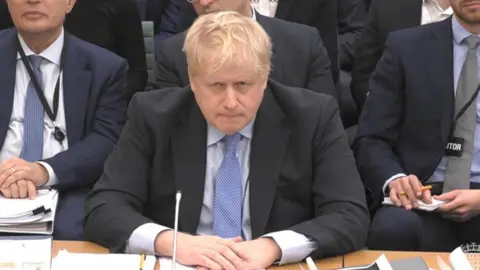What is the Privileges Committee and who are its members?
 House of Commons/UK Parliament
House of Commons/UK ParliamentBoris Johnson deliberately misled Parliament over parties at 10 Downing Street, a committee of MPs has found.
The former prime minister stood down as an MP ahead of the Privileges Committee's report, claiming he was "forced out of Parliament".
What is the Privileges Committee?
Committees are bodies in Parliament which examine issues such as laws or policies in more detail.
The House of Commons Privileges Committee investigates cases which "may prevent or hinder" the work of Parliament.
Its duties include looking at cases where MPs are accused of breaking rules.
The committee has been considering whether Mr Johnson misled MPs about what he knew about parties held in Downing Street during Covid lockdowns.
The committee has "privileges" in its name because it deals with certain privileges that MPs enjoy. These include immunity from legal prosecution for anything said in Parliament, to allow MPs to speak freely.
The committee was established in its current form in 2013 in the House of Commons. Similar work was previously done by a larger committee called the Standards and Privileges Committee.
Who are the Privileges Committee members?
Ahead of the release of its report, Boris Johnson accused members of the committee of having a bias against him. He said: "Their purpose from the beginning has been to find me guilty, regardless of the facts."
However, four of the seven members of the committee are Conservative MPs (Sir Bernard Jenkin, Sir Charles Walker, Andy Carter and Alberto Costa).
Two members are Labour MPs (Harriet Harman and Yvonne Fovargue) and one represents the SNP (Allan Dorans).
The rules state the chair has to be a member of the official opposition - ie from the Labour party. Harriet Harman was unanimously elected to the post in June 2022.
What sanctions has the committee recommended for Boris Johnson?
The committee has said that if Mr Johnson had not already resigned as an MP, it would have recommended a 90-day suspension, which is an unusually long period.
A suspension of more than two weeks can trigger something called a recall petition, which in turn could lead to a by-election.
Two MPs on the committee - the SNP's Allan Dorans and Labour's Yvonne Fovargue - wanted Mr Johnson expelled from the House of Commons - a far more serious sanction.
In addition to the suspension, the committee also recommended that he should not be given a parliamentary pass, as is common for former MPs.
Commons leader Penny Mordaunt has confirmed that MPs will be able to debate "an amendable motion" related to the report in Parliament on Monday.
The debate will be followed by a free vote, which means political parties will not tell MPs what to do.
Why did Boris Johnson call the committee a "kangaroo court"?
Boris Johnson was widely criticised for describing the committee as "a kangaroo court" in his resignation statement.
The phrase generally refers to a group acting without legal authority which hastily reaches a verdict without considering evidence.
Mr Johnson's conduct was referred to the committee after a vote in the House of Commons in April 2022. It did not call for evidence until June 2022, once the police investigation into Partygate had finished.
At his evidence hearing, Mr Johnson criticised committee chair Harriet Harman for having "said some things about this matter before reading the evidence".
He was referring to comments she made on Twitter in April 2022, when she said that if Boris Johnson and then Chancellor Rishi Sunak accepted a fine for a lockdown breaking party, "they are also admitting that they misled the House of Commons".
Ms Harman replaced the previous chair Sir Chris Bryant, who decided he should not lead the investigation because of his previous criticism of Mr Johnson's rule-breaking.
Can the committee only investigate MPs?
No - it can also decide if non-MPs have been in contempt of Parliament.
In 2019, the Privileges Committee examined the refusal of Boris Johnson's former adviser Dominic Cummings to give evidence to another parliamentary committee.
It found that Mr Cummings was in contempt of Parliament and recommended that the House of Commons should pass a resolution criticising him.
